
The Moronic Inferno: And Other Visits to America (1986) is a collection of non-fiction essays on the subject of America, by the British novelist Martin Amis.

The Moronic Inferno: And Other Visits to America (1986) is a collection of non-fiction essays on the subject of America, by the British novelist Martin Amis.
In the book's introduction, Amis reveals that he had been asked to write a book about America on previous occasions, but that The Moronic Inferno had come together "unpremeditated, accidental, and in installments" while he was "upending [his] desk drawer to prepare a collection of occasional journalism". [1] The 'Moronic Inferno' of the title is a phrase that Amis acknowledges is derived from a line by Saul Bellow, who in turn had borrowed it from the British author Wyndham Lewis. [2] [3] [4]
The twenty-six articles collected, many of which are expanded from their original forms and containing postscripts commenting on subsequent developments after publication, are drawn from Amis' numerous contributions to The Observer , the New Statesman , The Sunday Telegraph Magazine , the London Review of Books , Tatler , and Vanity Fair [5] between 1977–85. The articles consider, among other things, American politics, major literary figures, the evangelical Christianity movement, cinema, sex, and numerous facets of popular culture.
In the New Statesman , Jason Cowley wrote, "In journalistic mode, Amis is without peer: when he writes about writers — indeed, when he writes about anyone, such as Hugh Hefner — the long profile becomes, in his hands, a capacious, infinitely flexible form in which to combine reportage, criticism, humour, exalted phrase-making, and a clear-eyed, penetrating sense of purpose...Not a month passes, but I encounter someone who has read, and been influenced by, The Moronic Inferno and Other Visits to America, a collection of journalism first published in 1986, but one that continues to enjoy a radiant afterlife. The Moronic Inferno includes some of the best profiles of writers ever written. They are as memorable as any postwar literary essay I have read." [6] In his study Understanding Martin Amis, critic James Diedrick called the book, "A superb collection." [7]

Saul Bellow was a Canadian–American writer. For his literary work, Bellow was awarded the Pulitzer Prize, the 1976 Nobel Prize in Literature, and the National Medal of Arts. He is the only writer to win the National Book Award for Fiction three times, and he received the National Book Foundation's lifetime Medal for Distinguished Contribution to American Letters in 1990.
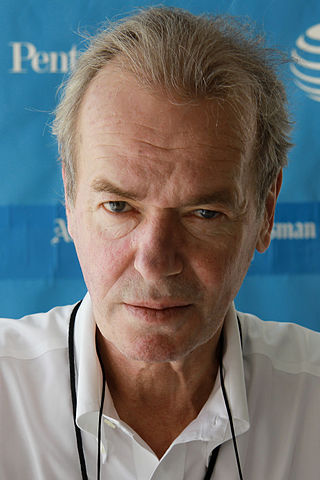
Sir Martin Louis Amis was an English novelist, essayist, memoirist, and screenwriter. He is best known for his novels Money (1984) and London Fields (1989). He received the James Tait Black Memorial Prize for his memoir Experience and was twice listed for the Booker Prize.
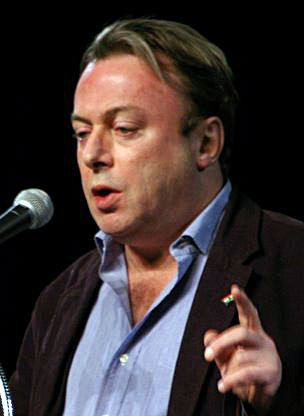
Christopher Eric Hitchens was a British author, journalist and educator. Author of 18 books on faith, culture, politics and literature, he was born and educated in Britain, graduating in the 1970s from Oxford with a degree in Philosophy, Politics and Economics. In the early 1980s, he emigrated to the United States and wrote for The Nation and Vanity Fair. Known as "one of the 'four horsemen'" of New Atheism, he gained prominence as a columnist and speaker. His epistemological razor, which states that "what can be asserted without evidence can also be dismissed without evidence", is still of mark in philosophy and law.

Christina Hambley Brown, Lady Evans, is an English journalist, magazine editor, columnist, broadcaster, and author. She is the former editor in chief of Tatler, Vanity Fair and The New Yorker, and the founding editor in chief of The Daily Beast. From 1998 to 2002, Brown was chairman of Talk Media, which included Talk Magazine and Talk Miramax Books. In 2010, she founded Women in the World, a live journalism platform to elevate the voices of women globally, with summits held through 2019. Brown is author of The Diana Chronicles (2007), The Vanity Fair Diaries (2017) and The Palace Papers (2022).
James Martin Fenton is an English poet, journalist and literary critic. He is a former Oxford Professor of Poetry.
Martian poetry was a minor movement in British poetry in the late 1970s and early 1980s, in which everyday things and human behaviour are described in a strange way, as if by a visiting Martian who does not understand them. Poets most closely associated with it are Craig Raine and Christopher Reid.

Adrian Anthony Gill was a British journalist, critic, and author. Best known for his food and travel writing, he was also a television critic, was restaurant reviewer of The Sunday Times, wrote for Vanity Fair, GQ, and Esquire, and published numerous books.
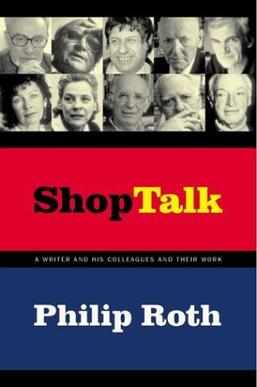
Shop Talk: A Writer and His Colleagues and Their Work is a collection of previously published interviews with important 20th-century writers by novelist Philip Roth. Among the writers interviewed are Primo Levi, Aharon Appelfeld, Ivan Klima, Isaac Bashevis Singer, Milan Kundera, and Edna O'Brien. In addition, the book contains a discussion with Mary McCarthy about Roth's novel The Counterlife and a New Yorker essay on Saul Bellow. Roth's trip to Israel to interview Appelfeld inspired his novel Operation Shylock.
James Robert Atlas was a writer, especially of biographies, as well as a publisher. He was the president of Atlas & Company and founding editor of the Penguin Lives Series.
The Information is a 1995 novel by British writer Martin Amis. The plot involves two forty-year-old novelists, Gwyn Barry (successful) and Richard Tull. Amis has asserted that both characters are based on himself. It is, says Amis, a book about "literary enmity".

The Anatomy Lesson is a 1983 novel by American author Philip Roth. It is the third novel from Roth to feature Nathan Zuckerman as the main character.

Diana Trilling was an American literary critic and author, one of a group of left-wing writers known as the New York Intellectuals.

Yellow Dog is the title of a 2003 novel by the British writer Martin Amis. Like many of Amis's novels, the book is set in contemporary London. The novel contains several strands that appear to be linked, although a complete resolution of the plot is not immediately apparent. An early working title for the novel, according to an interview Amis gave with The Observer Review in September 2002, was Men in Power. Despite some rather harsh criticism, Yellow Dog made the longlist for the Man Booker Prize in 2003.
The Pregnant Widow is a novel by the English writer Martin Amis, published by Jonathan Cape on 4 February 2010. Its theme is the feminist revolution, which Amis sees as incomplete and bewildering for women, echoing the view of the 19th-century Russian writer, Alexander Herzen, that revolution is "a long night of chaos and desolation". The "pregnant widow", a phrase taken from Herzen's From the other shore (1848–1850), is the point at which the old order has given way, the new one not yet born. Amis said in 2007 that "consciousness is not revolutionised by the snap of a finger. And feminism, I reckon, is about halfway through its second trimester."

Dead Babies is Martin Amis's second novel, published in 1975 by Jonathan Cape. Its first UK and US paperback edition was published under the title Dark Secrets. Amis's second novel—a parody of Agatha Christie's country-house mysteries—takes place over a single weekend at a manor called Appleseed Rectory. In 2000, the book was adapted into a film of the same name, starring Paul Bettany and Olivia Williams. In 2001, BBC critic David Wood wrote "Amis's second novel ranks among his most incendiary with its mordant wit, black comedy, and sense of the violently absurd." It has an epigraph attributed to the Cynic Menippus and the novel has been interpreted as a Menippean satire.
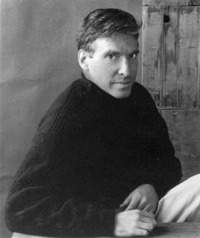
Benjamin Taylor is an American writer whose work has appeared in a number of publications including The Atlantic, Harper's, Esquire, Bookforum, BOMB, the Los Angeles Times, Le Monde, The Georgia Review, Raritan Quarterly Review, Threepenny Review, Salmagundi, Provincetown Arts and The Reading Room. He is a founding member of the Graduate Writing Program faculty of The New School in New York City, and has also taught at Washington University in St. Louis, the Poetry Center of the 92nd Street Y, Bennington College and Columbia University. He has served as Secretary of the Board of Trustees of PEN American Center, has been a fellow of the MacDowell Colony and was awarded the Iphigene Ochs Sulzberger Residency at Yaddo. A Trustee of the Edward F. Albee Foundation, Inc., he is also a Fellow of the New York Institute for the Humanities at New York University and a Guggenheim Fellow for 2012 - 2013. Taylor's biography of Marcel Proust, Proust: The Search, was published in October 2015 by Yale University Press as part of its newly launched Yale Jewish Lives series.
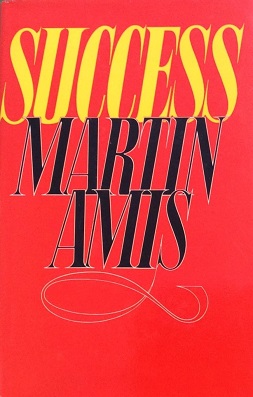
Success is Martin Amis's third novel, published in 1978 by Jonathan Cape.

Arguably: Essays is a 2011 book by Christopher Hitchens, comprising 107 essays on a variety of political and cultural topics. These essays were previously published in The Atlantic, City Journal, Foreign Affairs, The Guardian, Newsweek, New Statesman, The New York Times Book Review, Slate, Times Literary Supplement, The Wall Street Journal, The Weekly Standard, The Wilson Quarterly, and Vanity Fair. Arguably also includes introductions that Hitchens wrote for new editions of several classic texts, such as Animal Farm and Our Man in Havana. Critics' reviews of the collection were largely positive.

Inside Story is an autobiographical novel by the English author Martin Amis, published in 2020. It was Amis' final novel to be published before his death in 2023.
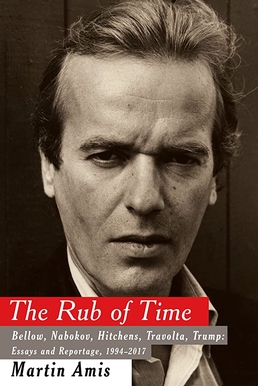
The Rub of Time: Bellow, Nabokov, Hitchens, Travolta, Trump: Essays and Reportage, 1994–2017 is a 2017 collection of non-fiction essays and criticism by the British author Martin Amis. It was his eighth nonfiction book and the final collection published during his lifetime.